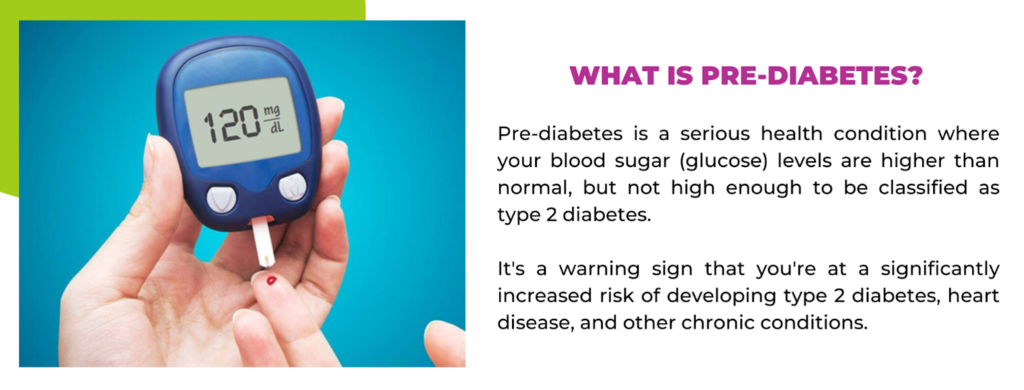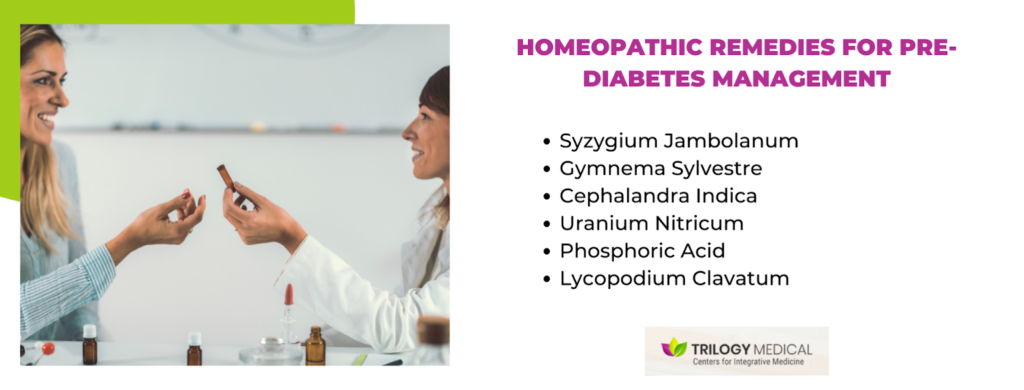The Role of Homeopathy in Pre-Diabetes Management
Pre-diabetes is a serious health concern. It significantly increases your risk of developing type 2 diabetes, heart disease, and stroke. While conventional medicine offers crucial management strategies, many individuals are exploring complementary approaches like homeopathy.

This blog post delves into the potential role of homeopathic medicine for pre-diabetes. We’ll discuss what homeopathy is, how it may help, and the different types of homeopathic remedies for pre-diabetes
What is pre-diabetes?
Pre-diabetes is a serious health condition where your blood sugar (glucose) levels are higher than normal, but not high enough to be classified as type 2 diabetes. It’s a warning sign that you’re at a significantly increased risk of developing:
- Type 2 diabetes: Your body struggles to effectively use insulin (a hormone that regulates blood sugar), leading to persistently high blood sugar levels.
- Heart disease and stroke: High blood sugar can damage blood vessels over time.
- Kidney damage: Your kidneys work overtime to filter excess sugar, which can strain them over time.
- Nerve damage (neuropathy): This can cause numbness, pain, and complications, particularly in the feet.
- Eye problems (retinopathy): Excess blood sugar can damage the delicate blood vessels in your eyes, potentially leading to vision loss.
Unfortunately, many people with pre-diabetes don’t have noticeable symptoms, making it easily overlooked.
How does homeopathy help manage pre-diabetes?
Homeopathy is based on the principle of “like cures like,” which posits that a substance that can produce symptoms similar to those of a disease in a healthy person can be used to treat similar symptoms in a person who is sick.
While there’s limited robust scientific evidence to support these mechanisms, here’s what homeopathic practitioners theorize:
- Stimulating the body’s self-healing: Homeopathy aims to trigger the body’s inherent ability to heal itself and restore balance. This may help regulate blood sugar levels and related metabolic processes.
- Addressing underlying imbalances: Homeopaths take a holistic approach, looking beyond just blood sugar. They may consider factors like insulin resistance, stress, and other health conditions, potentially improving overall metabolic function.
- Individualized treatment: Homeopathic remedies are not one-size-fits-all. Practitioners select them based on a person’s specific symptoms, health history, and overall constitution, aiming to address the root causes of pre-diabetes
Acute vs. constitutional remedies in homeopathic medicine for pre-diabetes
In homeopathy, managing pre-diabetes involves considering both acute and constitutional remedies, each serving distinct purposes.
Acute remedy in homeopathy
Acute remedies in homeopathy are used to address immediate symptoms or flare-ups associated with diabetes. These remedies are chosen based on the specific symptoms a person is experiencing at a given moment.

Constitutional remedy in homeopathy
Constitutional remedies in homeopathy take into account the individual’s overall health, temperament, and unique characteristics.
Unlike acute remedies, which target specific symptoms, constitutional remedies are selected based on a thorough assessment of the person’s physical, mental, and emotional state.
A qualified homeopath can provide guidance and recommend the most appropriate remedy for each case.
What are the common homeopathic remedies for pre-diabetes management?
Some homeopathic remedies traditionally used for blood sugar management include:
1. Syzygium Jambolanum
This is believed to help lower blood sugar levels and improve insulin sensitivity. It might also have antioxidant and anti-inflammatory properties that can benefit overall metabolic health.
2. Gymnema Sylvestre
This is a leafy vine native to India and nicknamed “the sugar destroyer.” Its mechanism of action is to temporarily block sugar receptors on the tongue, reducing sugar cravings. It could also increase insulin secretion and improve the uptake of glucose by cells.
3. Cephalandra Indica
Cephalandra indica is believed to support healthy insulin production and improve blood sugar control. It may stimulate the pancreas to produce more insulin and enhance insulin sensitivity in the body’s cells.
4. Uranium Nitricum
Uranium nitricum might help address excessive thirst and frequent urination, common symptoms associated with elevated blood sugar levels.
This homeopathic medicine for pre-diabetes could potentially reduce sugar excretion through urine and regulate blood sugar levels.
5. Phosphoric Acid
It may help with weakness, fatigue, and mental exhaustion often associated with pre-diabetes. Phosphoric acid could potentially improve energy levels and reduce stress-related blood sugar fluctuations.
6. Lycopodium Clavatum
Lycopodium clavatum may address digestive issues, sugar cravings, and weight management challenges often seen in pre-diabetes.
It’s crucial to remember that finding the proper homeopathic remedy can take time and is best done under the guidance of a qualified practitioner. Homeopathic medicine for pre-diabetes often requires careful individualization, as the homeopath may need to adjust the remedy based on the patient’s unique and evolving response.
Dr. Lester, with his 35 years of experience as a physician specializing in homeopathy, understands the complexities of this process. He recognizes that finding the right remedy, and often the correct progression of remedies (sometimes likened to peeling the layers of an onion), is a highly specialized art and science. Attempting to self-prescribe for chronic conditions is not recommended, as it is unlikely to be effective and may even delay proper treatment.
Where to find the best integrative medicine doctor near me?
Are you seeking holistic and effective solutions to manage conditions like pre-diabetes? Look no further than Dr. Jeff Lester at Trilogy Medical, your trusted partner in homeopathic care.
Why Choose Dr. Lester and Trilogy Medical?
At Trilogy Medical, Dr. Jeff Lester takes a comprehensive approach to health and healing, addressing not just the symptoms but also the underlying imbalances that contribute to conditions like diabetes.

By considering the whole person – body, mind, and spirit – Dr. Lester develops customized treatment plans tailored to each individual’s unique needs and experiences.
With years of training and clinical experience, Dr. Lester has helped countless individuals achieve optimal health and well-being through personalized homeopathic treatment. Some of the chronic conditions we treat include:
- Homeopathic treatment for IBS
- Holistic medicine for allergies
- Holistic medicine for asthma
- Homeopathy for weight loss
- Homeopathic for arthritis
- Alternative medicine for depression
- Homeopathy for sleep
- Homeopathic medicine for infection
And more!
Don’t let chronic conditions hold you back from living your best life. With expert guidance, personalized treatment, and compassionate care, you can achieve optimal health and well-being with the best integrative medicine in Santa Cruz.
Contact us today to schedule a consultation with our homeopathic doctor online. Take the first step towards unlocking your health potential!
The material contained on this site is for informational purposes only and DOES NOT CONSTITUTE THE PROVIDING OF MEDICAL ADVICE, and is not intended to be a substitute for independent professional medical judgment, advice, diagnosis, or treatment. Always seek the advice of your physician or other qualified healthcare providers with any questions or concerns you may have regarding your health.














